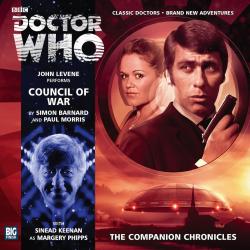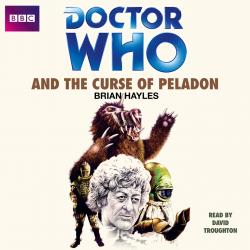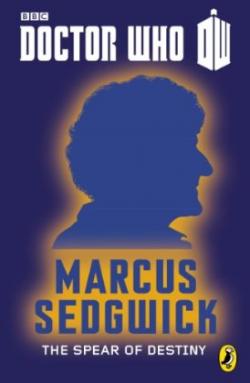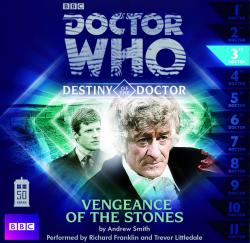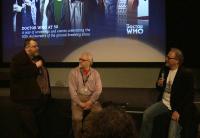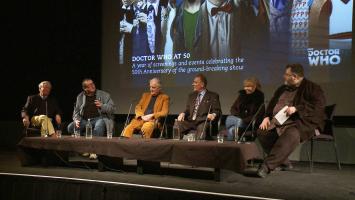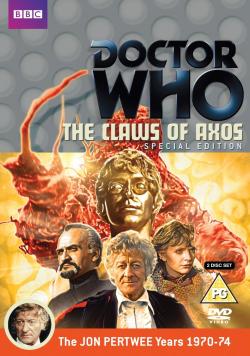This review is based on the UK Region 2 DVD release.Broadcast almost a year after this month's earlier release,
The Ambassadors of Death,
The Claws of Axos already represents how many view the Pertwee era, that of the cosy ensemble dealing with the invading "enemy of the week". But is this really a typical 'generic' story of the time or something a little more special?
There's plenty to fit what might one consider the "build a Pertwee story" template. The "UNIT Family" has come together at this point, with both Mike Yates and Jo Grant introduced this year to join the already established Brigadier and Benton; and of course their world nemesis (for this year at any rate) is also firmly recognised in the form of the The Master.
Another thing that is 'settled' by now is that the Doctor isn't about to sell his beloved humans down the river during the story. Even though it seems several times during the course of
Axos that he is more interested in his own escape from Earth, ultimately of course we know this isn't the case and it isn't particularly convincing during the story, either. Perhaps the cosiness dispels any potential drama to be made from these scenes, but of course it is needed in the narrative to convince the Master and the Axons of his duplicity if not the audience.
Rather than recalling a plot that (most) readers are more than familiar with, I'll just focus on a couple of bits that stuck in my mind when watching the story again. First up there's the 'staple' pompous official who refuses to understand the seriousness of anything in the form of Chinn. I say 'staple', but I can only actually think of one other off the top of my head - Walker in
The Sea Devils. In fact Chinn is really the unsung hero of the story in many respects, consistently doing the right thing for the wrong reasons - he wants to blow up the ship before it arrives on Earth, and then wants to keep Axonite for Britain when the Axons really want it spread globally. He'd see himself as the hero, at any rate! It's quite easy to imagine him as a regular liaison for the Brigadier, too - the two certainly seem familiar at the start of the story, even if the former isn't aware of the Doctor (oh, it's the return of the "Top Secret" documentation!), and as he says later,
"the perpetual interference of the UNIT people", inferring other interaction. Thinking about it, it's a shame
Peter Bathurst didn't reprise his role for
The Sea Devils!
Roger Delgado lights up the plot whenever he appears, and I can see why the production team (and Pertwee?) got worried about his becoming a more popular character than the Doctor himself. He also gets the best line of the story with the counter-measures to nuclear explosions summarised in the form of
"sticky tape on windows"!
Pigbin Josh - need I say more (grin)? For a character that could easily be dismissed as padding,
Derek Ware manages to pull off a charm to the character which genuinely makes one feel sorry for his demise - it's a shame his full 'disintegration' was cut to avoid too much nastiness (but it is on the deleted scenes to watch).
The Axons are well-realised, in both their humanoid golden forms and their tentacular counterparts - though the 'crawling carpet' during the episode two cliffhanger needs to be overlooked ... the use of Axonite to entice their 'prey' to do the work of seeding the planet for them is also a good ploy, though the time limit for distribution feels too artificial, simply to push the plot along.
It's always good to see familiar effects in play, like 'melting' doors (the wonders of polystyrene) and bubbly organic fluids (foam ahoy!). I also like the physical explosive effects used for body strikes that was also a staple of this time, something the resident stunt-men performed in abundance in this story as Axon tendrils flay about.
However, there's one thing that is a crying shame, and that's a potential regular who sadly was not to be ... Corporal Bell is an unsung heroine both here and in the preceding
The Mind of Evil, and it would have been nice to see her pop up many more times during the UNIT era - but at least she gets the immortal line about freak weather conditions over the south-east!
As an aside, one thing niggling me for years was the way in which the Doctor insists that the Master has left Earth; he's very adamant about it here, whereas in the proceeding
Colony in Space the initial exchange between him and the Brigadier is much lighter - it almost feels as if
Colony should have been broadcast first, continuity-wise (the way in which Jo reacts to the TARDIS also infers this). I asked
Terrance Dicks about this, but he wasn't able to recall whether there had been any intention to do this (as became quite common in later seasons) or if it had simply been a scripting issue he had overlooked during production. In any case, they are still in the 'traditional' order on my shelf!
In conclusion, I might have said more in support of the 'generic' nature of the story rather than being something special, but in fact I think it is one of the story's/series's greatest strengths and makes it all something special. There's really nothing wrong with having a 'familiarity' that the audience can identify with and almost take for granted, thus being able to pay more attention to the 'new' plot devices of the story - and that is hardly unique to Pertwee stories but a concept running throughout the show's lifetime over forty-nine years.
This story also has the 'honour' of containing my earliest memory of Doctor Who, which I recall as being a moment when a girl turns round and screams at something coming out of a wall; this turns out to be the cliffhanger to episode one (who says cliffhangers are no longer required?!?!). Whether or not that proved too scary is now long forgotten, though my next memory is The Green Death so maybe the Doctor's adventures were initially a bit too much for this toddler! The DVD
One of the selling points of this new special edition is the way in which the story has been remastered and image quality improved since the story's original release in 2005. Episode three was presented on the big screen at the Recon event in September, but I didn't think the improvements were very evident when blown up to cinematic size. Watching in a normal television environment does reveal a crisper, deeper image to before, however, and the improvement in quality is clearly evident.
With the release of a special edition the main interest is going to be in what has been added since the original release. No new commentary here, but there is a fresh set of production notes by
Martin Wiggins to accompany the episodes, wherein the usual factoids encompass items such as the seemingly rife acts of theft in studios rearing its head again during episode one, how wall throbbers almost led to industrial action, the 'death' of
The Vampire from Space,
THE VERY WONDERFUL MICHAEL FERGUSON, and also highlighting the first use of framing CSO to being scale to a scene (perhaps best realised for the sandminer control deck in
The Robots of Death!).
The second DVD presents us with the new documentary,
Axon Stations!, which delves into the making of the story. As one might expect there is quite a bit of detail, including how the story might have featured giant skulls and giant carrots, and on how we narrowly missed out on
Pigbin Josh - The Series! The only minor irritation I had with the feature was a 'squelching' sound as captions came up, but fortunately it wasn't that often.
The other major addition is a feature in which DVD presenter
Toby Hadoke gets to spend a weekend with the larger-than-life
John Levene. Though at times it looked like Toby was a trapped rabbit in need of an escape route, it is actually an entertaining romp (Levene seeming to take on some of Tom Baker's more eccentric moments in interviews), with reflections from the actor's friends and even his mother - though town-folk seemed a bit bewildered by the star in their midst! But does John make a good cooked breakfast - watch and decide for yourselves ...
Disc 1 has the previous edition's out-takes and deleted scenes, and on disc two this is expanded from the original 26m58s to a whopping 1h12m48s! Unlike the former, this doesn't have accompanying production notes so you'd have to have watched the shorter one first to understand the context of some of the re-takes, etc.
Former release material includes the Now and Then featurette (which though having been made several years ago still reflects the locations which have changed little since that or indeed the story itself was recorded!), and the Michael Feguson interview 'Directing Doctor Who' (I'd forgotten he'd pushed for the rehearse-record approach to production that is so often associated with the modern series).
Sadly, however, the feature on Reverse Standards Conversion has been dropped, which is understandable considering the technique has been superceded for the special edition, but means that you'd still need to retain the original release for that - and of course means that the mention of the aptly-named Peter Axon was also lost!
(Update: it's still there, but as an Easter Egg now!)Next Time
It's back to a time of BBC strife and the story that became a legacy as the incomplete
Shada becomes the Fourth Doctor's penultimate non-SE DVD release ...
The Legacy Box is due out on 7th January next year.
